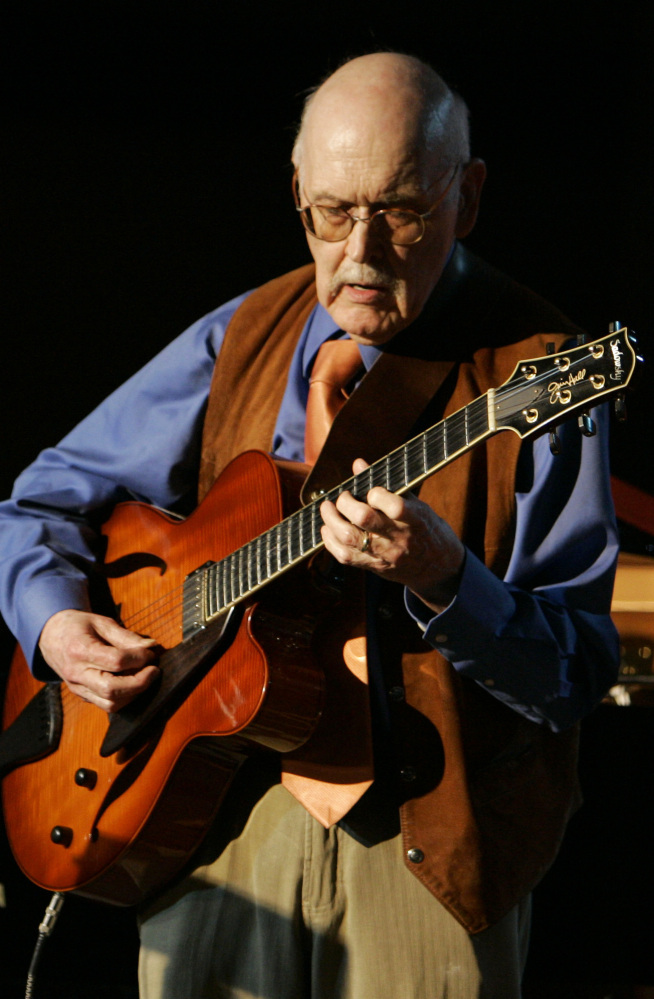NEW YORK — Jim Hall, one of the leading jazz guitarists of the modern era, whose subtle technique, lyrical sound and introspective approach strongly influenced younger proteges such as Pat Metheny and Bill Frisell, died early Tuesday at age 83, his wife said.
Hall died in his sleep after a short illness at his Greenwich Village apartment in Manhattan, said Jane Hall, his wife of 48 years who described her husband as “truly beloved by everybody who ever met him.”
Hall, who led his own trio since the mid-1960s, remained active until shortly before his death. Last month, his trio performed a concert at Jazz at Lincoln Center’s Allen Room with guest guitarists John Abercrombie and Peter Bernstein. He had been planning a duo tour in Japan in January with bassist Ron Carter, a longtime partner.
In 2004, Hall became the first of the modern jazz guitarists to be named a National Endowment for the Arts Jazz Master, the nation’s highest jazz honor.
“Jim was one of the most important improvising guitarists in jazz history. His musical generosity was an exact reflection of his deep humanity,” guitarist Metheny, who performed and recorded in a duo with Hall, said in an email to The Associated Press.
In the mid-1950s, as a member of pianist Jimmy Giuffre’s innovative trio and drummer Chico Hamilton’s chamber jazz quartet, Hall transformed the role of the guitar in jazz with his understated melodic and minimalist approach.
“What seems kind of frivolous and doesn’t really impress me is guys, people, women … who have amazing technique but everything sounds worked out,” Hall said in a 2003 interview for the National Endowment for the Arts. “Usually I wish I had the kind of technique to do that and then not do it, sort of. I like to make some kind of composition happen while I’m playing. That involves motive development. … I also love melodies. So I try to play melodies over tunes – have it go someplace and then come back.”
The guitarist was known for his duo and small group recordings with some of the greatest names in jazz during the past 60 years, including saxophonists Sonny Rollins, Gerry Mulligan, Ornette Coleman and Paul Desmond, pianist Bill Evans, bassist Red Mitchell and singer Ella Fitzgerald.
As a member of Rollins’ quartet in the early 1960s, Hall appeared on the landmark 1962 album, “The Bridge,” which was the tenor saxophonist’s first recording after a three-year hiatus during which he practiced his chops on the Williamsburg Bridge. The saxophonist’s fiery playing contrasted with Hall’s subdued guitar lines.”
Hall was born on Dec. 4, 1930, in Buffalo, New York, and his family later moved to Cleveland. He picked up the guitar at age 10, and became interested in jazz as a 13-year-old when he went to the store to buy a Benny Goodman record and first heard Charlie Christian playing guitar on the tune “Grand Slam.”
Hall is survived by his wife, a psychoanalyst, and his daughter, who was married to the late NEA Jazz Master John Levy, a bassist who is credited as the first African-American personal manager in jazz.
Send questions/comments to the editors.



Success. Please wait for the page to reload. If the page does not reload within 5 seconds, please refresh the page.
Enter your email and password to access comments.
Hi, to comment on stories you must . This profile is in addition to your subscription and website login.
Already have a commenting profile? .
Invalid username/password.
Please check your email to confirm and complete your registration.
Only subscribers are eligible to post comments. Please subscribe or login first for digital access. Here’s why.
Use the form below to reset your password. When you've submitted your account email, we will send an email with a reset code.